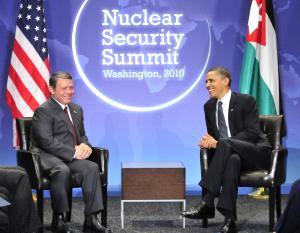Ammon News - AMMAN // Jordan’s civilian nuclear programme is gaining momentum, even as negotiations with Washington stall over a nuclear agreement that would allow US firms to transfer nuclear know-how, equipment and fuel to this nation of 6.4 million people.
The main impetus driving Jordan’s civilian nuclear programme is the growing demand for energy. Jordanian officials say nuclear power would reduce Jordan’s dependence on imported oil and serve as a long-term alternative for electricity generation, water desalination and energy security. It could also allow Jordan to export electricity to neighbouring countries.
Three years ago, Jordan imported 96 per cent of its energy at a cost of US$3.2 billion (Dh11.75bn), or 24 per cent of imports and 20 per cent of GDP. In the first half of 2009, the cost of crude-oil imports increased by 132 per cent, and by the end of the year they were costing the country US$4 bn. Last year, despite a in oil prices, energy costs consumed 11.8 per cent of Jordan’s GDP, according to the ministry of energy.
Jordanian officials say they cannot afford to pause efforts to meet the country’s energy needs. Preparations are under way for a plant set to be located 11 kilometres east of the Aqaba coastline along the Red Sea in southern Jordan and expected to generate 750 to 1,100 megawatts of electricity starting in 2019.
“We are pressing ahead with our programme. The commission has entered into a competitive dialogue with three technology providers we have short-listed as the most preferred bidders to build the country’s first power plant in 2013,” Khalid Touqan, chairman of the Jordan Atomic Energy Commission (JAEC), said. “We will eventually decide on the most preferred technology by the end of March next year.”
Companies from Canada and Russia, as well as a Franco-Japanese consortium, are bidding to oversee construction of as many as four nuclear power plants in Jordan in the next three decades, Mr Touqan said.
Already, Jordan has signed nuclear co-operation deals with eight countries – including France, the UK, China and Russia – and is aiming to sign similar deals with Japan, the Czech Republic and Romania by the end of the year, Mr Touqan said. These agreements involve technical exchange, employee training, nuclear-fuel disposal, nuclear safety, public education and advice on regulatory frameworks.
Last month, South Korea also loaned $70 million for the construction of a $130m, five-megawatt research reactor at the Jordan University of Science and Technology.
Ironically, what has complicated Jordan’s drive for nuclear energy and its close ties with Washington are major deposits of uranium discovered on its soil.
Officials here now believe the country has the potential to fuel nuclear power plants using its own resources, as well as export uranium ore, following the discovery of 65,000 tonnes of uranium in central Jordan. Uranium extracted from phosphate deposits could boost that total to 110,000 tonnes, representing nearly two per cent of the global total, according the World Nuclear Association.
Jordan has signed an exploration agreement with the French company Areva. The commission, along with the Chinese mining company Sino Uranium and the British-Australian company Rio Tinto, are currently exploring uranium deposits in the northern and southern parts of Jordan, Mr Touqan said.
“We knew that we had uranium since the Eighties, but not in commercial amounts,” he added. “Field work is showing promising results.”
Washington’s concern that a nuclear-armed Iran may prompt other countries in the region to develop nuclear weapons, has prompted it to prod one of its key Mideast allies to forgo uranium enrichment altogether, much as the UAE did when it signed a pact with the US in January 2009. But resource-scarce Jordan does not want to give up its rights under the Non-Proliferation Treaty (NPT), which it signed in 1974.
It is not economically feasible for Jordan to build an enrichment plant now, but as regional demand for uranium grows, that may change, said a Jordanian official close to the negotiations.
A US State Department official, who spoke to The National on condition of anonymity, said his country supports civilian uses of nuclear energy in Jordan and elsewhere in the Middle East.
“We continue to conduct negotiations with Jordan on a possible agreement for nuclear co-operation”, the official said. “We are working with our partners to develop the infrastructure necessary to meet the highest provided international standards for safety, security, and non-proliferation of such programmes.”
GRAPHIC ON NUCLEAR ASPIRATIONS IN THE REGION
But the Jordanian official, who also agreed to be quoted only on condition of anonymity, said that although Jordan has no plans to process and enrich uranium, it does not want to give up its right to do so.
“Under the NPT, we are allowed to enrich uranium by up to 20 per cent for peaceful means. We only need four per cent enrichment to power the plants,” he said.
An additional protocol the country signed with the IAEA in 1998 allows unannounced inspections of any nuclear facility in Jordan.
“This makes us not only transparent, but committed to the highest levels of the requirements of non-proliferation,” the official said.
By Suha Philip Ma’ayeh, Foreign Correspondent/ The National
